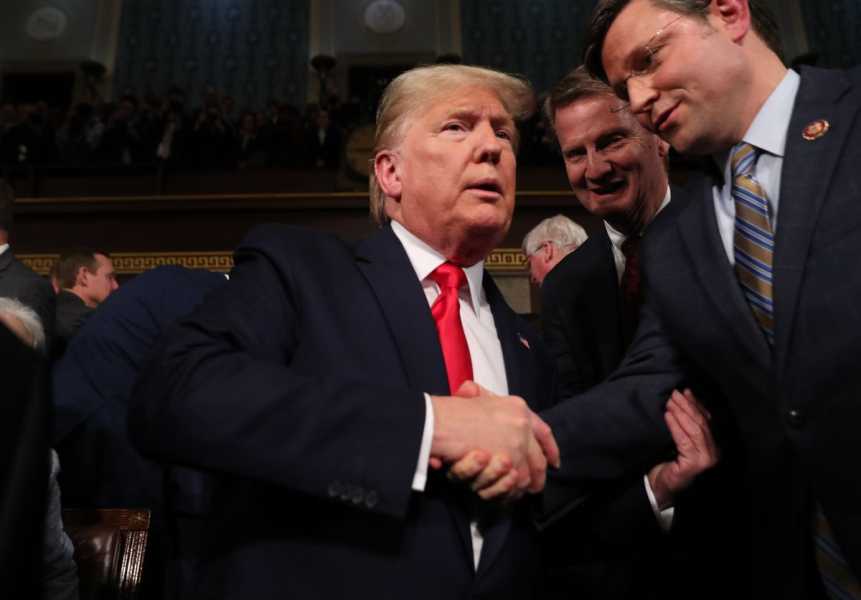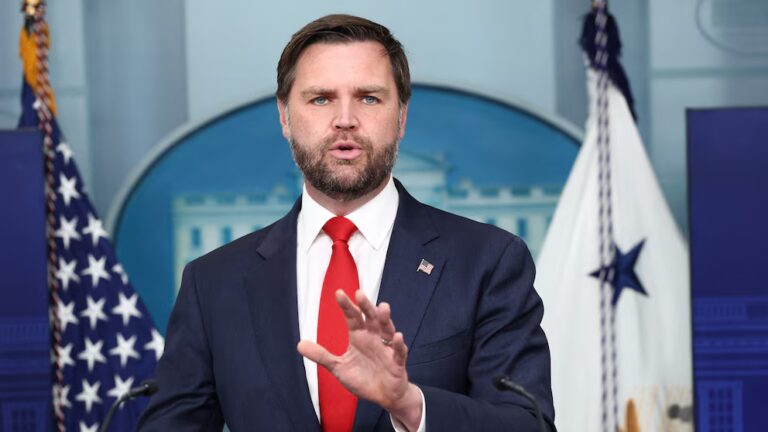Are GOP leaders more aligned with Democrats than with the MAGA right? Mostly no — but sometimes yes.

Senate Majority Leader Charles Schumer (D-NY), Senate Minority Leader Mitch McConnell (R-KY), and then-House Minority Leader Kevin McCarthy (R-KY), in the Capitol Rotunda in 2022. Anna Moneymaker/Getty Images Andrew Prokop is a senior politics correspondent at Vox, covering the White House, elections, and political scandals and investigations. He’s worked at Vox since the site’s launch in 2014, and before that, he worked as a research assistant at the New Yorker’s Washington, DC, bureau.
As Republican hardliners tossed Speaker Kevin McCarthy out of office and attempted to dictate his replacement, one word kept recurring in their complaints about existing GOP leaders: “uniparty.”
The term crystallizes an idea widespread on the MAGA right: that too many Republican politicians and especially leaders are, on key issues, aligned with Democrats and the Washington establishment, and working against Donald Trump and the right.
“Right now, we are governed by a uniparty that Speaker McCarthy has fused with Joe Biden and Hakeem Jeffries,” Rep. Matt Gaetz (R-FL) said last month, as McCarthy seemed set to keep the government funded and avoid a shutdown. This was the justification Gaetz gave for his push to oust McCarthy (though he may have had personal reasons as well). And since enough other House Republicans were dissatisfied with McCarthy’s handling of the spending battles, Gaetz succeeded.
One key outside ally for Gaetz was Steve Bannon, the former Trump aide and now commentator. Bannon frequently deploys the “uniparty” epithet, as he’d done for years. He’s long tried to purge the GOP of its more conventional members, replacing them with hardliners who will more loyally back Trump and far-right causes.
In many ways, the idea that Kevin McCarthy was indistinguishable from a Democrat seems self-evidently absurd. The two parties are deeply polarized and locked in seemingly eternal partisan warfare. The GOP has moved far to the right on abortion, immigration, trans rights, gun rights, environmental regulation, and other issues while backing Trump ever more fervently.
Indeed, “uniparty” is an exaggerated, sloppily conceived concept that’s often deployed as a way to blame the right’s own failures to achieve a conservative policy paradise on some sort of dastardly conspiracy against them by their own leaders.
And yet sometimes it’s not entirely off-base.
That’s because there are important issues where many Republican elites have long thought the MAGA right’s preferences are wrongheaded or downright dangerous — and where those elites work, either openly or subtly, to ensure Trump and his acolytes don’t get what they want.
These range from major foreign policy questions about the US’s role in the world, to preferences about tactics in government spending battles, to issues at the heart of American democracy — such as whether elections that Donald Trump loses should be certified.
Now, Trump and Gaetz are declaring the election of Mike Johnson as speaker of the House as a win for “MAGA Mike.” But will Johnson be able to transform the speakership? Or will he inevitably be drawn, by the institutional incentives of the job, toward governing more like McCarthy? Maybe you either die a MAGA hero, or you live long enough to see yourself become the uniparty.
The origins of the “uniparty” term

US Green Party presidential candidate Ralph Nader speaks to reporters on July 12, 2000, at the National Press Club in Washington, DC. Shawn Thew/AFP via Getty Images
Politicians and political commentators have long loved a good rhetorical flourish that pits them as plucky underdogs fighting for the interests of the common people against a dastardly, powerful cartel.
Depending on who is using the term, this cartel can be called any number of things: the deep state, the swamp, the special interests, the Blob, the Cathedral, or simply Washington. The commonality is the suggestion that they’re the people who are really in control, and who are therefore responsible for all the problems the country faces.
But “uniparty” is useful for those who want to say there’s something rotten with the party they’d typically prefer. In 2000, that was leftist supporters of presidential candidate Ralph Nader, who complained that the Democratic Party had become functionally indistinguishable from the GOP. As Ben Zimmer wrote for Politico Magazine, online supporters of Nader disparaged the “corporate UniParty,” and Nader himself used the term in a book.
Conservatives, meanwhile had long slapped moderate Republican politicians with the label “RINO,” Republican in Name Only. That has a similar vibe to “uniparty.” But by the mid-2010s, many on the right felt frustrated and disillusioned with the GOP establishment. Complaints included GOP leaders’ openness to immigration reform and free trade, foreign policy failures exemplified by the Iraq war, the failure to drastically cut spending under President Barack Obama, and a general sense that the party simply didn’t “fight” Democrats hard enough.
Trump’s presidential campaign became the vessel for these frustrations. So commentators affiliated with the populist right, like Ann Coulter and Breitbart editor-in-chief Alexander Marlow, began denouncing Republican Trump critics (of which, back then, there were many) as the “uniparty.” In Coulter’s telling, this included “the Republican Brain Trust, the Washington Establishment, the Insiders, … the lobbyists, the consultants, the think tanks, [and] the pollsters.”
Trump himself preferred to talk about “the swamp” and, once in office, the “deep state” — likely because disparaging the Republican Party made little strategic sense for him once he was the leader of that party.
But once Bannon was ousted from Trump’s White House, he started using the term again to denounce all the GOP establishment squishes who were undermining the MAGA agenda. He’s still doing so today — and so, now, is Donald Trump Jr., who tweeted in July that Florida Gov. Ron DeSantis’s primary campaign was “the Uniparty vs. Trump & MAGA.”
Is the uniparty in some sense real?

Congressional leaders Mitch McConnell, Harry Reid, and John Boehner link arms to sing “We Shall Overcome” at a 2014 ceremony to posthumously award the Congressional Gold Medal to Martin Luther King Jr. Drew Angerer/Getty Images
The framing of Trump as inexorably opposed to a hostile GOP establishment is oversimplified and out of date on many issues. As president, Trump happily embraced conventional Republican policies on many issues (tax cuts, judicial appointments, rolling back regulations) while the GOP establishment moved in his direction on others (party elites largely abandoned their longtime support for immigration reform and free trade deals). Trump is perfectly comfortable with big business and big donors, and did little during his presidency to challenge their power. Many, if not most, leading Republicans now see themselves as fully on the Trump team.
And yet it’s still true that a core of Republican elites has major temperamental, tactical, and substantive differences with Trump and the right — sometimes to the point where they really do seem more aligned with Democrats, and to be working against the right either openly or subtly.
Foreign policy: These differences are perhaps most intense on foreign policy. Trump has made clear that he supports massively overhauling US foreign policy. He’s talked frequently about withdrawing from NATO, pulling back US troops from deployments abroad, and generally playing a less active active role in world affairs. The latest flashpoint for this clash of visions is the Russian invasion of Ukraine, with the MAGA right becoming intensely opposed to aiding Ukraine further.
The traditional hawkish Republican elite has fiercely resisted these changes. While Trump was president, his defense secretaries regularly delayed or slow-walked his troop withdrawal orders. If Trump had actually tried anything like withdrawing from NATO while in office, he would have seen major resignations of top officials (though former Trump national security adviser John Bolton warns it may happen if he is elected to a new term). Senate Minority Leader Mitch McConnell has loudly championed Ukraine’s cause, and Kevin McCarthy has reportedly tried to find a way to get more Ukraine aid through the House despite right-wing opposition.
(It should be noted that a leftist’s conception of “uniparty foreign policy” would be rather different — they’d point out hawkishness toward China, high levels of military spending, and support for Israel as areas where there’s now little difference between the two parties. And Obama aide Ben Rhodes viewed that administration’s foreign policy on Iran and the Middle East as an effort to push back against a “Blob” of entrenched establishment thinking. But the right’s concept of a “uniparty” is just about issues where the establishment disagrees with them.)
Election theft: When Trump tried to steal the 2020 election from Biden, the Republican Party did not act in a disciplined, unified way to help him to do it — much to his chagrin. Yes, many elected Republicans claimed to doubt Biden’s wins in certain states and said they wanted them thrown out, and most who knew better did little to stop Trump. And several, including the new speaker of the House, actively tried to help him.
But key Republicans with positions of authority to affect the results — governors, state legislative leaders, state election officials, Justice Department officials, judges, and the vice president — overwhelmingly didn’t use their formal powers to help Trump pull off the steal. The uniparty united around the shared belief that respecting the results of American elections and the peaceful transfer of power is important. Trump would like to stop that from happening again.
Government spending battles: Even before Trump’s rise, many conservatives have long resented what they see as the GOP establishment’s willingness to cave to Democrats on spending policy, when they want far greater cuts. (Trump himself never staked too much on these fights while he was president — when he brought on a shutdown, it was instead over trying to get more money for his border wall.)
After one such government spending deal in 2013, Angelo Codevilla, who would become a leading intellectual voice of the pro-Trump right, wrote: “The Republican Party’s leaders have functioned as junior members of America’s single ruling party, the UniParty.” Whatever differences existed between then-congressional leaders, Republicans John Boehner and Mitch McConnell and Democrats Nancy Pelosi and Harry Reid, he said, got “worked out behind closed doors.”
GOP establishment leaders in Congress and on the appropriations committees generally profess that they’d love to cut spending more, but that the activists’ demands and their understanding of politics are simply absurdly unrealistic. They argue that the level of cuts demanded by the right would be deeply unpopular, that there’s no way to force Democrats to cave when they control key levers of government, and that a prolonged government shutdown would hurt Republicans politically.
But the hardliners suspect all this is cover for a comfort with the status quo, and a lack of desire to truly disrupt Washington. And Gaetz used the latest government spending agreement between McCarthy and Democrats as a pretext to oust McCarthy from the speakership.
Can Trump break the uniparty or is it here to stay?

Then-President Donald Trump is greeted by future speaker of the House Mike Johnson (R-LA) before Trump’s State of the Union address in the House chamber on February 4, 2020. Leah Millis/Getty Images
In a sense, the “uniparty” idea is an attempt to answer a question: Why are so many Republican elites still so resistant to following Trump or the base on key issues?
One theory, pushed by Bannon and Codevilla before him, is that it’s about the people: The wrong Republicans, lacking sufficient loyalty to Trump and the cause, are in these jobs. So if Trump is returned to power, his appointees should be more carefully chosen for loyalty to the MAGA cause, not just the GOP. Purportedly uniparty-aligned elected officials should be primaried and replaced with MAGA-friendly candidates.
Replacing McCarthy with Johnson — a longtime conservative and Christian right activist who helped Trump try and steal the 2020 election — is, in this thinking, a major step forward.
That surely has some truth to it, but it’s not the whole story. Because another view is that the supposed “uniparty” politicians are often responding to the institutional incentives and pressures of their roles — and that even MAGA diehards in those roles will face the same incentives and pressures.
Notably when Trump was president, he regularly caved to the supposed “uniparty.” He could have overridden his appointees and forced quicker troop withdrawals, but he often didn’t. He could have forced bigger fights about cutting spending, but he generally didn’t. As president, with his political future and a whole agenda at play, he had to weigh priorities and calculate political blowback.
In government, it’s often said that “where you stand depends on where you sit.” Appointees to head government agencies typically become champions of their particular agencies’ priorities. Similarly, if you’re a right-wing media commentator or a representative in a deep red district, your only real priority is to please a far-right audience, and you have no real responsibility to govern or achieve anything.
But if you’re speaker of the House, you have different priorities. You have to manage the concerns of the vulnerable swing-district members on whom your majority depends. You have to cultivate big-money donors who fund your effort to keep that majority. And you actually have responsibility over policy.
One major tell about how this works will be seen in how Speaker Johnson approaches Ukraine aid. As a little-known Congress member in a deep red district, he frequently criticized aid to Ukraine. In May 2022, he said, “We should not be sending another $40 billion abroad when our own border is in chaos, American mothers are struggling to find baby formula, gas prices are at record highs, and American families are struggling to make ends meet, without sufficient oversight over where the money will go.”
But now, as speaker of the House, he was playing a different tune. “We can’t allow Vladimir Putin to prevail in Ukraine because I don’t believe it would stop there,” Johnson said on Fox News Thursday. “We’re not going to abandon them.” The uniparty may have life in it yet.
Sourse: vox.com






